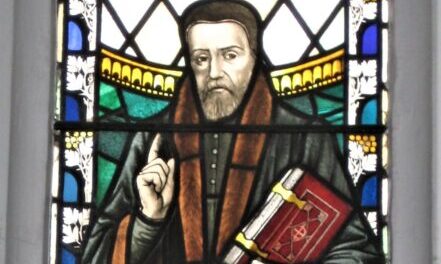
Tyndale’s New Testament
William Tyndale (c.1491-1536) from Gloucestershire was a martyr to the English language in his self-appointed though ultimately fatal mission to produce an English translation of the Bible for the ordinary citizen subjugated by the Church’s adherence to Latin. The English language owes this pioneer immense gratitude, not only in unlocking access to the Bible but also in elevating and enriching the language of the English populace.
After studying at Oxford, Tyndale became a priest in 1515. In 1523 he went to London to seek a sponsor for his daring Bible project, punishable by death if discovered, but in 1524 decided it would be safer in Germany. Translated directly from the Greek text, Tyndale’s New Testament was finally printed in 1526 and copies were smuggled into England.
Undeterred by denouncements of heresy by the panicked Establishment, Tyndale, now in Belgium, began his translation of the Old Testament from Hebrew. This was halted in 1535 when he was betrayed, imprisoned for 18 months, then strangled and burned at the stake. However, he had started the ball rolling and in 1611 the King James Version of the Bible incorporated much of Tyndale’s work. The perceived threat had turned out to be a golden opportunity to ‘spread the Word’ even further.
(Image: Weglinde at Wikimedia Commons / Public domain)
